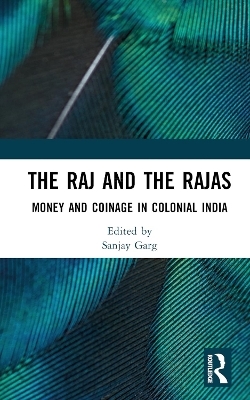
The Raj and the Rajas
Routledge (Verlag)
978-1-032-42452-1 (ISBN)
The decline of the Mughal Empire, the political ascendency of the British East India Company, a number of revivalist powers (the Sikhs, the Marathas, the Rohillas, etc.), and a large number of Indian princely states, resulted in redrawing the political spaces across India. In the process, the minting rights of the titular Mughal king and of the neo-independent Indian princely rulers were severely curbed by the dominant colonial power, both for political as well as economic reasons. The territorial expansion of the British Empire in India was invariably followed by the abolition of the native mints and the introduction of the imperial currency in the annexed territories. Indeed, the ‘sikka’ followed the flag.
By presenting the monetary history of this period, this volume seeks to address some of the questions, viz. the effect of money supply on trade, prices of commodities and services, wage structures in different regions as well as on the administrative and military health of a political power.
In this unique anthology, published studies along with unpublished archival records have been integrated into an overall theme. Together with a comprehensive bibliography-cum-list for further readings this volume is aimed to serve as a veritable reference tool.
Sanjay Garg (b. 1965) is an eminent scholar with extensive research experience in history of South Asia, with specialization in economic and monetary history, currency and coinage, architecture and archival studies. His research findings have been widely published in print and multimedia, and include The Sikka and the Raj (2013). For a complete list of publications, see: http://sanjaygarg.wikidot. com/bibliography. Dr. Garg has been serving in the National Archives of India since 1988 and is presently holding the post of Deputy Director of Archives. Simultaneously, he is also working as Officer on Special Duty (OSD) at the Azadi ka Amrit Mahotsav Secretariat created at the Ministry of Culture, Government of India, to celebrate the 75 years of India’s Independence.
List of Illustrations List of Tables Introduction to the Series Preface Acknowledgements Abbreviations Introduction: Sanjay Garg PART I: STUDIES 1. Sovereignty and the ‘Sikka’ under the Raj: Minting Prerogatives and Imperial Legitimacy in India 2. The Raj and the Rajas: A Tale of Numismatic Diplomacy 3. ‘Sikka’ and the Crown: Genesis of the Native Coinage Act, 1876 4. A Metallic Mirror: Changing Representation of Sovereignty on Indian Coins during the Raj 5. Change of Superscription on Coins of Native States, 1858-1872 6. Economic Relations between the Paramount Power and the Princely States of India, 1858-1881 7. Suppression of the Native Mints a. The Coins of the Bombay Presidency: I. The Mints of the Northern Districts II. The Transitional Mints of the Southern Maratha Country III. The Transitional Mints of the Deccan IV. Introduction of Machine-made Copper Coins into the Bombay Presidency: The Challenge of Local Mints b. The Coins of the Ceded and Conquered Provinces of the Bengal Presidency: I. Mints of Northern India II. The Farrukhabad Mint PART II: RECORDS 1. Resolution: Suppression of the Native Copper Coin, and for General Introduction of the Government Copper Coin, 28 February 1862 2. Resolution: Introduction of British Coins into Bundelkhand in Place of Native Coins in Circulation, 21 March 1864 3. The Case of Cooch-Behar a. Financial Condition and the Coinage of Cooch Behar State, 1864 b. Introduction of the Coinage of British India into Cooch Behar, 1864 4. Manufacturing of Coins by Native States, 1868 5. Manufacture of Copper Coin in Birmingham Mint for Some Native States of India, 1869 6. Suggestion of Financial Department that Native Chiefs having Mints be Induced to Forego them, or that they should Assimilate their Coins with Government of India Ones, 1869 7. Mints in Native States: Uniform Coinage throughout India Impossible at Present, 1870 8. Secretary of State’s Despatch Relative to Mintage Still Existing in Native States, 1872 9. Coinage in British Mints for Native States, 1876 10. Regulation or Suppression of Mints in Native States, 1876 11. Gold and Silver Annually Coined by Native States in India, 1885 12. Proposal to Generally Restrict the Coinage of Copper by Native States in Rajputana, 1886-1887 13. Particulars Regarding the Currencies of Native States, 1895 14. Reports on the Measures Taken by the Native States to Substitute British Currency for Native Currencies, 1896 Bibliograph Contributors Index
| Erscheinungsdatum | 06.08.2022 |
|---|---|
| Zusatzinfo | 32 Tables, black and white; 132 Halftones, black and white; 132 Illustrations, black and white |
| Verlagsort | London |
| Sprache | englisch |
| Maße | 138 x 216 mm |
| Gewicht | 1006 g |
| Themenwelt | Geisteswissenschaften ► Geschichte ► Regional- / Ländergeschichte |
| Geschichte ► Teilgebiete der Geschichte ► Wirtschaftsgeschichte | |
| Naturwissenschaften ► Geowissenschaften ► Geografie / Kartografie | |
| Sozialwissenschaften ► Soziologie ► Spezielle Soziologien | |
| Wirtschaft ► Volkswirtschaftslehre ► Finanzwissenschaft | |
| ISBN-10 | 1-032-42452-4 / 1032424524 |
| ISBN-13 | 978-1-032-42452-1 / 9781032424521 |
| Zustand | Neuware |
| Haben Sie eine Frage zum Produkt? |
aus dem Bereich


